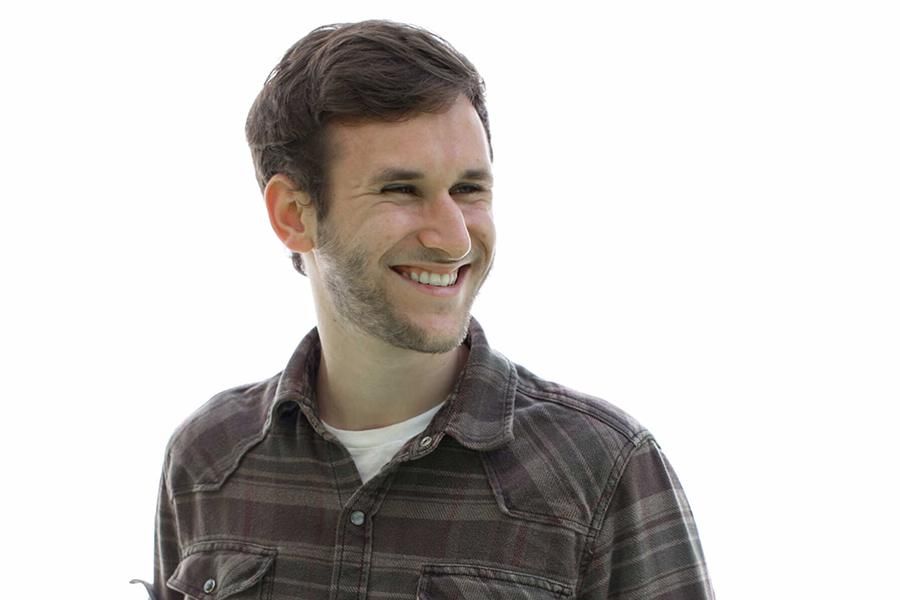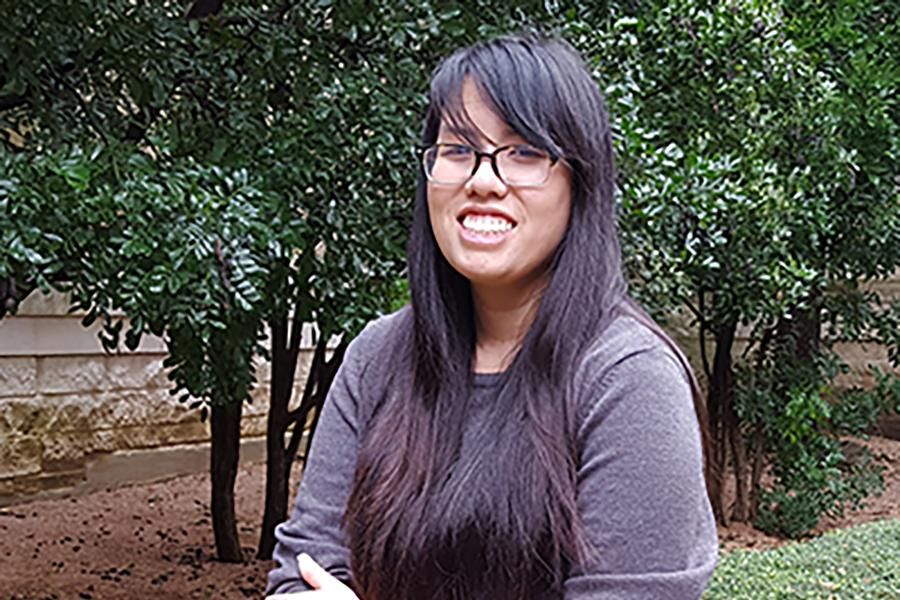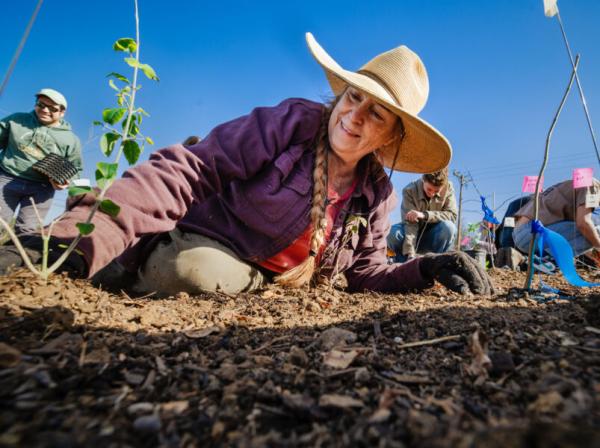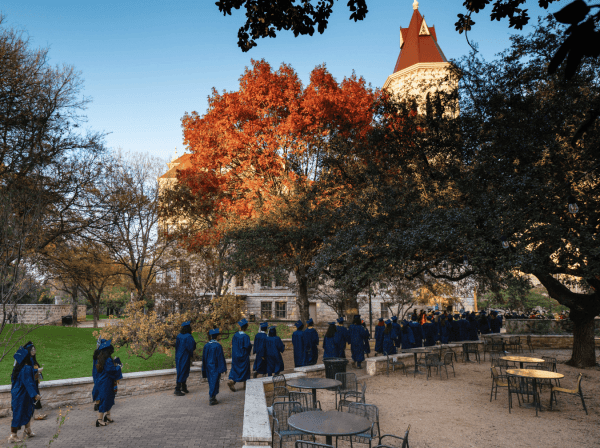Advice from the Best and the Brightest
It’s no secret that students at St. Edward’s win big recognition. Last year, for example, the university was named the nation’s No. 1 producer of U.S. Fulbright Students among master’s institutions. But what’s even more compelling than accolades like this are students’ own stories — how they navigated the tough application process, what set them apart, their best tips for future students and where they hope to make their mark next.
Andrea Calderon ’19, Environmental Science and Policy

Award: Doris Duke Conservation Scholar
What she did: Conducted field research last summer in ecosystems across California — Big Sur, Sagehen, the White Mountains, Sierra Nevada and Yosemite.
Biggest application challenge: “Writing the essays. The topics weren’t difficult; instead, I had a problem narrowing down all the stuff I had to say into a limited amount of space.”
What made her application stand out: “I was an exchange student in Italy during my gap year between high school and college. This helped me stand out because the internship is all about bringing diversity and cultural acceptance into the field of conservation.”
The St. Edward’s difference: “I try to take advantage of all the opportunities St. Edward’s offers students to get involved on campus. I think the selection committee saw how involved I was and found this appealing.”
Where she is now: Studying abroad in San Jose, Costa Rica, and planning for her second summer internship through the Doris Duke program.
Ultimate goal: “I want to start a nonprofit that helps developing nations with the use of solar energy.”
Best tip: “Do your best to show the committee who you really are through your essays. If conservation is something you’re truly passionate about, the committee will be able to see that.”
Courtney Dymowski ’14, Photocommunications and Art History

Award: Davies-Jackson Scholarship
What she did: Completed a two-year Art History program at the University of Cambridge.
Biggest application challenge: “Answering the three different prompts. At that point, I wasn’t very comfortable attacking essay questions from the other side — considering what would be exciting, unexpected and insightful for the scholarship committee to read.”
What made her stand out: “I approached the application from a different angle. Rather than running with my first instinct, I considered what types of responses the committee likely received and what essay I could write that would be intriguing and provocative.”
The St. Edward’s difference: “When I was in the thick of applying for fellowships, my advisor and professors were right there as I questioned if I actually had a shot at applying, as I tired of writing and rewriting my statements. They not only offered words of advice, but showed their confidence in me as someone who deserved to ask for and pursue anything that came my way.”
Where she is now: Planning the inaugural Gallery Weekend in Kuala Lumpur, Malaysia, as part of an arts management residency.
Ultimate goal: “I would love to work for an international arts organization creating programs that foster cultural diplomacy, whether it’s planning traveling exhibitions, initiating artist exchanges or facilitating community projects. I want to use art as a catalyst and tool for learning about other people, cultures and ideas.”
Best tip: “Just apply. The worst case is you don’t get the scholarship. The best case is that you end up studying a subject you love, in England, and graduate with a new breadth of possibilities and opportunities.”
Luke Schubert ’18, Communication

Award: U.S.–U.K. Fulbright Summer Institute
What he did: Spent a month in Bristol, England, studying the causes and effects of the transatlantic slave trade during the 17th, 18th and 19th centuries.
Biggest application challenge: “Probably editing the two required essays. I found the difficult part to be condensing what you want to say into the short space you’re given.”
What made him stand out: “Communicating my conviction and motivation to participate — and backing that up with real experience. I had been working in a civil rights law firm up until I applied, and I explained how that experience related to the program. Plus a little bit of humor and personality (usually) doesn't hurt!”
The St. Edward's difference: “St. Edward’s has awesome resources for seeking out and applying for scholarships and fellowships. Also, the university's small size makes it easier to find opportunities to get involved in different activities that you can then use in your application.”
Where he is now: “I'm finishing my junior year and am interning for the Workshop for Global Understanding. I'm interested in researching how emerging technologies, such as artificial intelligence, can play a role in driving economic inequality in the world.”
Ultimate goal: “I have absolutely no idea! I guess you could say I’m keeping my options open.”
Best tip: “Pick the program that interests you the most. It’s not necessary to have a background or experience in what the program is about, but it’s important to make it evident why the Fulbright Commission should choose you.”
Victoria Ochoa ’15, Political Science

Award: Harry S. Truman Scholarship
What she did: Completed a fellowship at the Partnership for Public Service through the Truman Summer Institute and participated in the Truman-Albright Fellows Program in the fall.
Biggest application challenge: “The interview. One by one, each finalist (there were 10) is called out for a 20-minute interview, and you don't get to leave until everyone finishes. It's a very aggressive, uncomfortable process.”
What made her stand out: "Where I come from in the Rio Grande Valley, students don't often get to interview for things like the Truman Scholarship. I'm one of the lucky ones, and I have always felt a deep responsibility to make the most of every opportunity so I can create opportunity for others. I communicated that passion and sense of responsibility."
The St. Edward’s difference: “St. Edward's really nurtured and looked after me — it helped me develop intellectually and spiritually.”
Where she is now: Wrapping up a job in the U.S. Secretary of Commerce's office.
Ultimate goal: “I want to change how government works along the Texas-Mexico border. I want to make sure that the government works for communities of color, is responsive to them, and is effective and efficient.”
Best tip: “Seek out an academic environment and a culture where you're going to be happy and have the ability to grow and experience new things professionally and personally.”
Jonathan Stoughton ’18, Global Studies

Award: Boren Scholarship from the National Security Education Program
What he’s doing: Studying Arabic at the University of Jordan and the School for International Training in Amman.
Biggest application challenge: “Writing the essays. Boren applicants are required to write two different essays, one personal statement and the other about the study abroad program they have chosen. I spent months developing and rewriting mine.”
What made him stand out: “The essays. I was clear about my thoughts and reasons for learning Arabic and convinced the selection committee that it would be beneficial for them to award me the scholarship.”
The St. Edward’s difference: “One benefit of going to a small university is that there are a lot of opportunities to interact with the professors and other faculty members. I did not shy away from these opportunities and received a lot of support during the application process.”
Ultimate goal: “I am constantly thinking about different goals, but I haven’t made up my mind. I fluctuate between practicing law, working for the government or advocating for human health services through a private organization.”
Best tip: “Start early. You want plenty of time to craft your essays and talk to professors about letters of recommendation. And talk to [Director of Fellowships] Caroline Morris.”
Alex Robertson ’17, English Writing and Rhetoric

Award: Critical Language Scholarship from the U.S. Department of State
What she did: Spent a summer living with a host family and learning Turkish in Ankara in an intense immersion program.
Biggest application challenge: “The personal statement. I don't like talking about myself to strangers, so it was difficult to anticipate the audience I'd be addressing in the essay.”
What made her stand out: “My geography, more than anything. The CLS program had had a few students from Wyoming in their Turkish programs before, but if memory serves me correctly, no more than two.”
The St. Edward’s difference: “What really makes St. Edward’s stand out is that it’s a service-oriented university. Regardless of what kind of scholarship program someone runs, having students with the ability to see beyond themselves is alluring in itself.”
Where she is now: Serving as editor in chief of Sorin Oak Review, the university's student-run creative and literary journal.
Ultimate goal: “I am passionate about writing and nonprofits, and I am enraptured with traveling. Any position that allows me to do one, both or (dare I say it) all three with a great team of coworkers will quite easily satisfy me.”
Best tip: “Don't apply if you expect your host country to be like America. Seriously, if you apply for a program that involves travel to a foreign country with the belief that America's ways are the only or best ways, or that the people in your host country should cater to you, you're cheating yourself out of an opportunity to learn equally good and possibly better perspectives.”
Jenny Vo ’17, Social Work

Award: Benjamin A. Gilman Scholarship
What she did: Studied for a semester at Ritsumeikan Asia Pacific University in Beppu, Japan.
Biggest application challenge: “The writing component. I don’t see myself as a strong writer, and I struggle at times to properly voice my message and what the study abroad experience will do for my future.”
What made her stand out: “I think my passion was part of why my application got some attention. It was thanks to Caroline Morris that my paper was able to accurately express what I felt for Japan and the desire that I’ve had to go there.”
The St. Edward’s difference: “St. Edward’s is known for its global involvement and inclusion. It encourages students to step out of their comfort zone and be more aware of the world outside the United States. This sort of reputation definitely stands out to study abroad scholarships.”
Where she is now: Back on campus in Austin finishing her senior year as a Social Work major.
Ultimate goal: “Help people as an art therapist and empower them with the necessary tools to live and function on their own, confidently and successfully.”
Best tip: “Don’t be afraid to reach out for help. The Writing Center on campus is there to strengthen your writing and refine what you wish to express. Also talk to people close to you for help defining your interests and passions and what this scholarship can do to help.”


